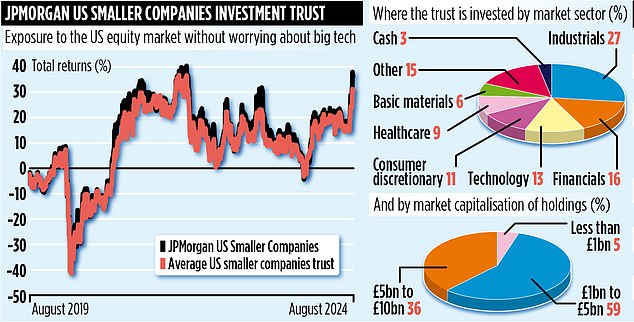Small listed companies in the United States didn’t escape the battering most equity markets took – in response to fears that the West’s biggest economy is heading for recession, and the Federal Reserve’s refusal to join the Bank of England in snipping away at interest rates.
The Russell 2000 Index, a barometer of the stock market fortunes of US smaller companies, slid sharply before rebounding towards the end of the week – finishing on Thursday night at 2,084, 8 per cent lower than at the end of July.
The downturn was in marked contrast to last month when the index gained 10.2 per cent – mainly in response to the tougher outlook for some of the so-called Magnificent Seven technology companies (Alphabet, Amazon, Apple, Meta, Microsoft, Nvidia and Tesla).

Although Jonathan Brachle, manager of JPMorgan US Smaller Companies Investment Trust, says the Russell 2000 Index will remain volatile for the time being, he still believes the investment case for a somewhat forgotten sub-sector of the US equity market is robust.
‘August and September tend to be weaker months for US equities,’ he says, ‘and we shouldn’t forget that the US presidential election is fast approaching.
‘Yes, the economy may not be as strong as it could be, but more jobs are being created than lost, and what we are hearing from the companies we hold is not as downbeat as some are suggesting.’
The trust does everything to protect shareholders from downside risks. Brachle and his investment team are meticulous about the firms they buy – and are not slow in exiting holdings that don’t live up to expectations.
‘We like companies that generate strong and durable cash flows,’ explains Brachle. ‘We also like the businesses to be backed by quality management teams. And of course, we look for signals that suggest the company’s valuation on the stock market will rise.’

He adds: ‘On average, we hold stocks for four to five years, and we will exit if a company looks overvalued by the market – maybe earlier if there is a change of direction from management that we don’t like, or a new executive team comes in with fresh ideas.’
Currently, the trust has 86 holdings with the average market capitalisation of about $5 billion (£4 billion).
Big stock positions are limited to 5 per cent while biotech stocks tend to be no-goes because they often don’t have a sufficient earnings record to warrant inclusion in the trust.
BJ’s Wholesale Club is indicative of the kind of business that the trust likes to hold. ‘It’s a Costco lookalike,’ says Brachle, ‘in that its customers are all members and pay an annual fee to shop in its stores. This results in a healthy recurring stream of revenue which provides it with all-important financial stability.’
Another key holding is MSA, which supplies safety equipment to the fire service and oil and gas producers. ‘It operates in an area where spending on its equipment is non-discretionary,’ says Brachle. ‘That underpins its cash flow which we like.’
The trust has outperformed its peer group over the past five years – 37 per cent versus 30 per cent, but slightly underperformed over the past 12 months (13 per cent versus 14 per cent).
Over the past ten full calendar years, it has outperformed its benchmark Russell 2000 on seven occasions.
The trust’s stock market identification code is BJL5F34 and its ticker JUSC. Annual charges total 0.93 per cent and it pays a small dividend – 3 pence a share last year with the shares currently priced at just above £4.30.
DIY INVESTING PLATFORMS

AJ Bell

AJ Bell
Easy investing and ready-made portfolios

Hargreaves Lansdown

Hargreaves Lansdown
Free fund dealing and investment ideas

interactive investor

interactive investor
Flat-fee investing from £4.99 per month

Saxo

Saxo
Get £200 back in trading fees
Trading 212
Trading 212
Free dealing and no account fee
Affiliate links: If you take out a product This is Money may earn a commission. These deals are chosen by our editorial team, as we think they are worth highlighting. This does not affect our editorial independence.
This article was originally published by a www.dailymail.co.uk . Read the Original article here. .


